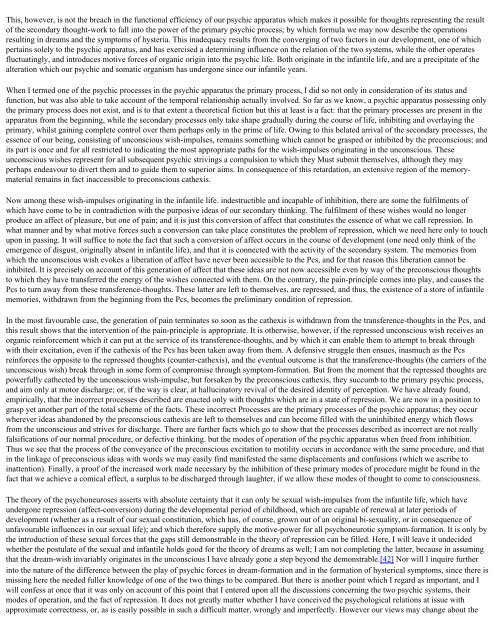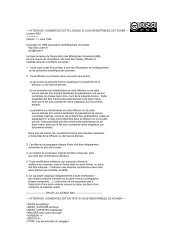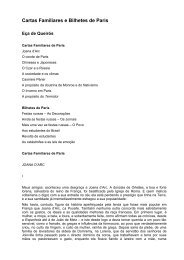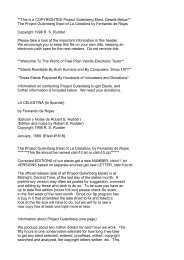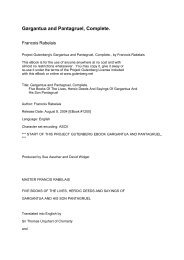The Interpretation of Dreams Sigmund Freud (1900)
The Interpretation of Dreams Sigmund Freud (1900)
The Interpretation of Dreams Sigmund Freud (1900)
Create successful ePaper yourself
Turn your PDF publications into a flip-book with our unique Google optimized e-Paper software.
This, however, is not the breach in the functional efficiency <strong>of</strong> our psychic apparatus which makes it possible for thoughts representing the result<br />
<strong>of</strong> the secondary thought-work to fall into the power <strong>of</strong> the primary psychic process; by which formula we may now describe the operations<br />
resulting in dreams and the symptoms <strong>of</strong> hysteria. This inadequacy results from the converging <strong>of</strong> two factors in our development, one <strong>of</strong> which<br />
pertains solely to the psychic apparatus, and has exercised a determining influence on the relation <strong>of</strong> the two systems, while the other operates<br />
fluctuatingly, and introduces motive forces <strong>of</strong> organic origin into the psychic life. Both originate in the infantile life, and are a precipitate <strong>of</strong> the<br />
alteration which our psychic and somatic organism has undergone since our infantile years.<br />
When I termed one <strong>of</strong> the psychic processes in the psychic apparatus the primary process, I did so not only in consideration <strong>of</strong> its status and<br />
function, but was also able to take account <strong>of</strong> the temporal relationship actually involved. So far as we know, a psychic apparatus possessing only<br />
the primary process does not exist, and is to that extent a theoretical fiction but this at least is a fact: that the primary processes are present in the<br />
apparatus from the beginning, while the secondary processes only take shape gradually during the course <strong>of</strong> life, inhibiting and overlaying the<br />
primary, whilst gaining complete control over them perhaps only in the prime <strong>of</strong> life. Owing to this belated arrival <strong>of</strong> the secondary processes, the<br />
essence <strong>of</strong> our being, consisting <strong>of</strong> unconscious wish-impulses, remains something which cannot be grasped or inhibited by the preconscious; and<br />
its part is once and for all restricted to indicating the most appropriate paths for the wish-impulses originating in the unconscious. <strong>The</strong>se<br />
unconscious wishes represent for all subsequent psychic strivings a compulsion to which they Must submit themselves, although they may<br />
perhaps endeavour to divert them and to guide them to superior aims. In consequence <strong>of</strong> this retardation, an extensive region <strong>of</strong> the memorymaterial<br />
remains in fact inaccessible to preconscious cathexis.<br />
Now among these wish-impulses originating in the infantile life. indestructible and incapable <strong>of</strong> inhibition, there are some the fulfilments <strong>of</strong><br />
which have come to be in contradiction with the purposive ideas <strong>of</strong> our secondary thinking. <strong>The</strong> fulfilment <strong>of</strong> these wishes would no longer<br />
produce an affect <strong>of</strong> pleasure, but one <strong>of</strong> pain; and it is just this conversion <strong>of</strong> affect that constitutes the essence <strong>of</strong> what we call repression. In<br />
what manner and by what motive forces such a conversion can take place constitutes the problem <strong>of</strong> repression, which we need here only to touch<br />
upon in passing. It will suffice to note the fact that such a conversion <strong>of</strong> affect occurs in the course <strong>of</strong> development (one need only think <strong>of</strong> the<br />
emergence <strong>of</strong> disgust, originally absent in infantile life), and that it is connected with the activity <strong>of</strong> the secondary system. <strong>The</strong> memories from<br />
which the unconscious wish evokes a liberation <strong>of</strong> affect have never been accessible to the Pcs, and for that reason this liberation cannot be<br />
inhibited. It is precisely on account <strong>of</strong> this generation <strong>of</strong> affect that these ideas are not now accessible even by way <strong>of</strong> the preconscious thoughts<br />
to which they have transferred the energy <strong>of</strong> the wishes connected with them. On the contrary, the pain-principle comes into play, and causes the<br />
Pcs to turn away from these transference-thoughts. <strong>The</strong>se latter are left to themselves, are repressed, and thus, the existence <strong>of</strong> a store <strong>of</strong> infantile<br />
memories, withdrawn from the beginning from the Pcs, becomes the preliminary condition <strong>of</strong> repression.<br />
In the most favourable case, the generation <strong>of</strong> pain terminates so soon as the cathexis is withdrawn from the transference-thoughts in the Pcs, and<br />
this result shows that the intervention <strong>of</strong> the pain-principle is appropriate. It is otherwise, however, if the repressed unconscious wish receives an<br />
organic reinforcement which it can put at the service <strong>of</strong> its transference-thoughts, and by which it can enable them to attempt to break through<br />
with their excitation, even if the cathexis <strong>of</strong> the Pcs has been taken away from them. A defensive struggle then ensues, inasmuch as the Pcs<br />
reinforces the opposite to the repressed thoughts (counter-cathexis), and the eventual outcome is that the transference-thoughts (the carriers <strong>of</strong> the<br />
unconscious wish) break through in some form <strong>of</strong> compromise through symptom-formation. But from the moment that the repressed thoughts are<br />
powerfully cathected by the unconscious wish-impulse, but forsaken by the preconscious cathexis, they succumb to the primary psychic process,<br />
and aim only at motor discharge; or, if the way is clear, at hallucinatory revival <strong>of</strong> the desired identity <strong>of</strong> perception. We have already found,<br />
empirically, that the incorrect processes described are enacted only with thoughts which are in a state <strong>of</strong> repression. We are now in a position to<br />
grasp yet another part <strong>of</strong> the total scheme <strong>of</strong> the facts. <strong>The</strong>se incorrect Processes are the primary processes <strong>of</strong> the psychic apparatus; they occur<br />
wherever ideas abandoned by the preconscious cathexis are left to themselves and can become filled with the uninhibited energy which flows<br />
from the unconscious and strives for discharge. <strong>The</strong>re are further facts which go to show that the processes described as incorrect are not really<br />
falsifications <strong>of</strong> our normal procedure, or defective thinking. but the modes <strong>of</strong> operation <strong>of</strong> the psychic apparatus when freed from inhibition.<br />
Thus we see that the process <strong>of</strong> the conveyance <strong>of</strong> the preconscious excitation to motility occurs in accordance with the same procedure, and that<br />
in the linkage <strong>of</strong> preconscious ideas with words we may easily find manifested the same displacements and confusions (which we ascribe to<br />
inattention). Finally, a pro<strong>of</strong> <strong>of</strong> the increased work made necessary by the inhibition <strong>of</strong> these primary modes <strong>of</strong> procedure might be found in the<br />
fact that we achieve a comical effect, a surplus to be discharged through laughter, if we allow these modes <strong>of</strong> thought to come to consciousness.<br />
<strong>The</strong> theory <strong>of</strong> the psychoneuroses asserts with absolute certainty that it can only be sexual wish-impulses from the infantile life, which have<br />
undergone repression (affect-conversion) during the developmental period <strong>of</strong> childhood, which are capable <strong>of</strong> renewal at later periods <strong>of</strong><br />
development (whether as a result <strong>of</strong> our sexual constitution, which has, <strong>of</strong> course, grown out <strong>of</strong> an original bi-sexuality, or in consequence <strong>of</strong><br />
unfavourable influences in our sexual life); and which therefore supply the motive-power for all psychoneurotic symptom-formation. It is only by<br />
the introduction <strong>of</strong> these sexual forces that the gaps still demonstrable in the theory <strong>of</strong> repression can be filled. Here, I will leave it undecided<br />
whether the postulate <strong>of</strong> the sexual and infantile holds good for the theory <strong>of</strong> dreams as well; I am not completing the latter, because in assuming<br />
that the dream-wish invariably originates in the unconscious I have already gone a step beyond the demonstrable.[42] Nor will I inquire further<br />
into the nature <strong>of</strong> the difference between the play <strong>of</strong> psychic forces in dream-formation and in the formation <strong>of</strong> hysterical symptoms, since there is<br />
missing here the needed fuller knowledge <strong>of</strong> one <strong>of</strong> the two things to be compared. But there is another point which I regard as important, and I<br />
will confess at once that it was only on account <strong>of</strong> this point that I entered upon all the discussions concerning the two psychic systems, their<br />
modes <strong>of</strong> operation, and the fact <strong>of</strong> repression. It does not greatly matter whether I have conceived the psychological relations at issue with<br />
approximate correctness, or, as is easily possible in such a difficult matter, wrongly and imperfectly. However our views may change about the


